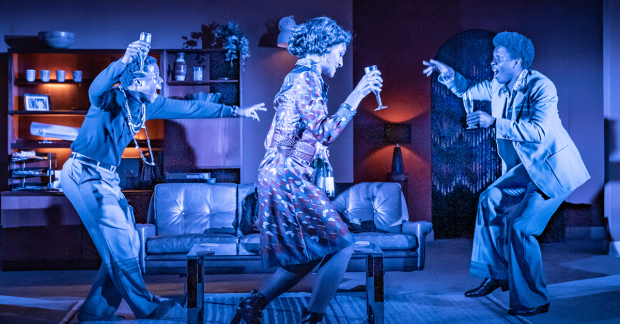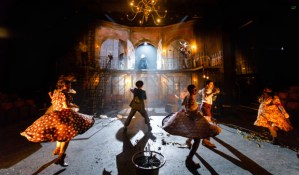Review: The Death of a Black Man (Hampstead Theatre)
Alfred Fagon’s play makes a triumphant return to Hampstead 46 years on from its debut

© Marc Brenner
Director Dawn Walton has said that what attracted her to The Death of a Black Man is the scarcity of Alfred Fagon productions, despite the praise his writing garners. Whilst there is little doubt that tonight's audience will be travelling home googling other British theatres staging the playwright's work, they will have to achieve something spectacular to match this production.
It says a great deal that the entire cast of Nickcolia King-N'da, Natalie Simpson and Toyin Omari-Kinch more than do justice to Fagon's writing. The Death of a Black Man puts its three characters, Shakie, Jackie and Stumpie, through a lot over the course of two hours but in Fagon's hands these arcs never seem rushed or contrived. The downfall within one Chelsea flat is as realistic as it is gripping.
It seems harsh to single out one performance when all three are so excellent but Simpson mesmerises as Jackie. She is the real catalyst in the story, manipulating Shakie with ease in the first act and these initial interactions between ex-lovers are some of the most subtle and alluring of the entire production. It is incredibly satisfying to watch the self-interested, self-proclaimed "businessman" toyed with, but equally Simpson is able to convey Jackie's eventual tragedy with such conviction. Watching her descend into hysteria is harrowing.
Simon Kenny's set is superb, working seamlessly with the time and tone of the play throughout. The year is apparent from the outset, with the 1973 England v West Indies scorecard illuminated on the stage curtain. This is in addition to actual match footage projected around Hampstead Theatre upon walking in, a lovely touch. The flat itself is every inch opulent 1970s fashion – panelled wooden furniture, plush carpets and beautiful wallpaper cocoon the characters as the champagne continues to flow in the first act.
From Shakie's father's death onwards however, all vibrance is drained from the picture. The set transforms into something skeletal and the decision to move the stage curtains back further is an absolute masterstroke. The flat looks like a floating prison, and it is impossible not to feel that even if Jackie were to escape, she'd fall to her death trying.
There is a noticeable moment towards the climax of the production where the trio turn one by one to face the audience head on. Johanna Town's lighting imbues the stage with a desolate blue as conversation continues. It seems strange to begin with, but it soon becomes apparent what Walton is achieving. The pressure inside the theatre is excruciating as the enormity of what Shakie and Stumpie are doing to Jackie is brutally hammered home. Forty-six years on from its debut in Hampstead, this is an urgent and brilliant production.


















